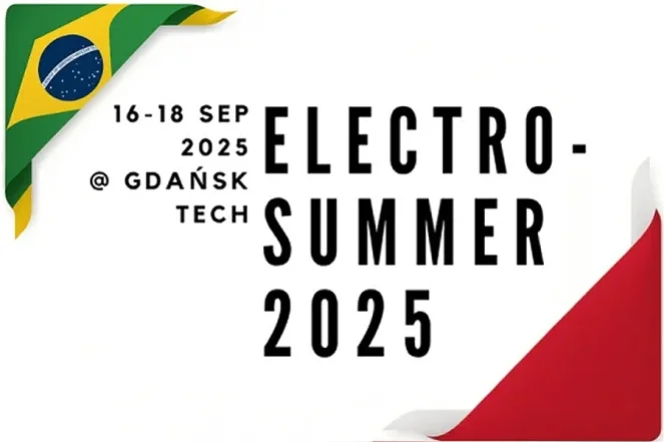Date added: 2025-07-25
Electro-Summer 2025 – Where Additive Manufacturing Empowers

Organized by the Faculty of Applied Physics and Mathematics, and Advanced Materials Centre with support from the team of Scientific Club RedOx, Poland’s first Electrochemical Society affiliated science club. Engage with peers, leading research groups and other students for better networking.
The event will take place from September 16 to 18. Registration is open until August 25.
Workshop Format
- 12 hours of scientific lectures open to the general public (transmitted online), hosted as part of the Advanced Materials Centre seminar series.
- 16 hours of hands-on laboratory sessions, plus seminars and interactive discussions with the RedOx scientific club members
Networking and knowledge exchange with top researchers dedicated to innovative electrochemical sensor development, automated low-cost platforms, and sustainable manufacturing. Organized by Prof. Jacek Ryl (Division of Electrochemistry & Surface Physical Chemistry, Gdańsk Tech) and his team, in collaboration with Prof. Rodrigo A.A. Muñoz and Brazilian colleagues. Supported by the patronage of Gdańsk Tech Vice-Rector for Partnership Prof. Józef Sienkiewicz.
This event is open for the ENHANCE Alliance students.
- ECTS points: 2
- Registration: Applications are open – only 16 available spots!
- Fee: Free for 16 selected participants (lunch & coffee breaks provided; no other expenses covered, dormitories reserved but not covered)
Featured Lecturers & Sessions
Prof. Rodrigo A. A. Muñoz – Additive Manufactured Electrodes: A New Generation of Low-Cost Electroanalytical Platforms
Professor and co-leader of Center for Research on Electroanalysis NUPE at the Federal University of Uberlândia in Brazil, specializing in low-cost analytical devices using 3D-printing with batch- and flow-injection analyses. His research spans applications in forensics, food, biological, and fuel analysis via printed electrochemical sensors. He is currently an affiliated member of the Brazilian Academy of Sciences.
Prof. Eduardo Mathias Richter – 3D Printing Technology as a Tool for Developing Automated Systems in Laboratories with Limited Infrastructure
Professor and co-leader of Center for Research on Electroanalysis NUPE at the Federal University of Uberlândia in Brazil, focuses on capillary electrophoresis, conductometric and amperometric methods, often tailored to low-resource lab settings. He also explores integration of flow-injection and batch-injection systems with low-cost printed electrodes, making automation more accessible.
Dr. Emilia Witkowska Nery – Simple sensors -easier, cheaper, and more versatile sensing with available materials
Sensor arrays group leader at the Institute of Physical Chemistry of the Polish Academy of Sciences with a PhD from the University of Campinas. She merges biology and engineering to build microfluidic electrochemical and optical sensors using paper, polymers, and electronic tongue systems, minimizing cost and complexity of the electrochemical systems.
Dr. Cristiane Kalinke – Sustainable Approaches for the Additive Manufacturing of Electrochemical (Bio)Sensors)
Based at University of Campinas and Manchester Metropolitan University, she investigates eco-friendly materials and protocols to 3D print biosensors, contributing to greener electroanalytical tools. Her co-authored guides offer practical recommendations on choosing designs, printing parameters, and post-treatments for sustainable sensor fabrication.
Dr. Raquel Gomes Rocha – 3D printing applied for electrochemical sensing: from the influence of printing parameters to the activation procedures
A doctoral researcher at Uberlândia Federal University and a postdoctoral fellow at Warwick University. She evaluates graphene/PLA composites, advancing on different activation protocols and showing how optimized parameters deliver significantly enhanced sensor performance.
Dr. Paulo Roberto de Oliveira – Development of Periodic Open-Cell Structures as Flow Reactors for Sustainable Chemical Processing
A postdoctoral researcher at Federal University of São Carlos and Manchester Metropolitan University, he develops open-cell 3D-printed reactor architectures enabling sustainable flow chemistry, coupling structural design with electrochemical functionality, aiming for eco-efficient processing reactors.
Dr. Mattia Pierpaoli – Print. Treat. Repeat. 3D Printing for Smarter Wastewater Treatment
An Assistant Professor at Gdańsk University of Technology whose main interests and expertise are in carbon nanomaterials for environmental applications, focusing on the detection and remediation of water pollutants, sustainable solutions, the use of 3D printing and machine learning in electroanalysis.
Dr. Mohsen Khodadadi Yazdi – Laser-Induced Graphene: From Discovery to Tailored Surface Functionalization and Real-World Applications
As Associate Professor at Gdańsk University of Technology, he leads work on laser-induced graphene and conductive nanocomposites for biosensors and electrodes. His research includes advanced wound dressings and dry electrodes for EEG, merging material functionalization with real-world biomedical and sensing applications.
Eight independent workshop sessions will allow participants to advance their understanding of different aspects of materials engineering (including FDM filaments and LIG electrodes fabrication as well as 3D printing troubleshooting), surface engineering protocols (activation and functionalization for performance boost and biosensing), and the use of 3D printed materials in environmental electroanalysis. These laboratories will be provided by the above lecturers and experts from Gdańsk Tech: Prof. Krzysztof Formela, Dr. Mateusz Cieślik, assisted by Gilvana P. Siqueira, a Ph.D. scholar in Gdańsk Tech under the Fahrenheit Scholarship, and other team members from Gdańsk Tech’s Electrochemistry and Surface Physical Chemistry group.



